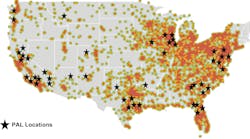Use CVSA's complaint review process if you get a roadside-inspection violation you think is unfair
If you operate a commercial fleet in the U.S., Canada, or Mexico, chances are pretty good you've had one of your vehicles inspected by motor carrier enforcement authorities.
The vast majority of the inspections are conducted by highly trained personnel working for professional law enforcement or public service/ utility organizations. This is not to say that all inspections are conducted properly or that resulting "violations" are issued correctly. Even the best inspectors make mistakes.
This has been a source of frustration for a number of fleets. In fact, many fleet managers have grudgingly paid fines or signed-off on unnecessary repairs, rather than go through the cumbersome bureaucratic process of trying to correct an inaccurate inspection and resulting fine.
But there is an efficient way to fight City Hall. It's called the Commercial Vehicle Safety Alliance (CVSA) Complaint Control Procedure. This system was developed and implemented several years ago to address industry complaints. Enforcement agencies have embraced the procedure as a means of "quality assurance," as well as another check on their enforcement efforts.
CVSA is an international organization of federal, state, and provincial government agencies and representatives from private industry in the U.S., Canada, and Mexico that are dedicated to improving commercial vehicle safety. Its goals include improving the safety of equipment; avoiding duplication of inspection efforts by different jurisdictions; minimizing inspection delays for trucks; improving commercial driver safety performance.
CVSA's complaint control procedure is generally initiated on receipt of a written complaint. If possible, submit copies of all supporting materials, including inspection documents, names of inspectors, dates, times, and locations, etc.
When complaints are received by CVSA or by the enforcement agency that conducted the inspection, they are date-stamped, given a complaint number, and entered into a complaint register at CVSA headquarters. Complainants are notified within seven working days. The appropriate jurisdiction is notified and must conduct a complete investigation within sixty working days.
When the investigation is completed, the complainant will be notified of any action taken to correct the situation. Copies of these notifications are also forwarded to CVSA headquarters.
It's important to remember that the complaint process is completely separate from the administrative/judicial process for violations or inspection/ repair defect notices that may have been issued. You still need to pay fines or appear in legal proceedings as mandated in the violation notice. If the complaint process finds that you are "in the right" at some later point in time, the enforcement agency will correct any previous legal action taken.
Given the volume of inspections conducted across North America, one would expect CVSA to handle a considerable number of complaints each year. But this is not the case. Since the inception of the program several years ago, the number of complaints in any given year has never totaled more than 25. This seems ludicrous. Either the process has not been well advertised, or fleets are willing to accept even unfair penalties as a cost of doing business.
However, I expect this to change as carriers begin to be penalized during the Federal Highway Administration's safety rating process, which is now in place.
You can write to CVSA at 5430 Grosvenor Lane, Suite 130, Bethesda, Md., or contact them online at [email protected]. If you register a complaint online, keep in mind that you still need to get copies of inspection reports, violation notices, and other documents to the agency so your complaint can be processed efficiently.
Note: Contributing editor Stephen Campbell is vp-safety, training, and technology for the Motor Freight Carriers Assn.


